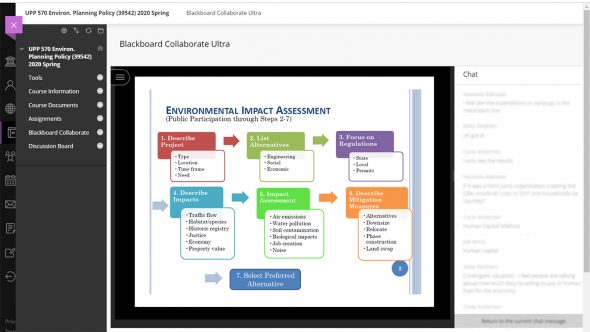Online learning boosts class participation

Ning Ai already had commenced her spring semester, implementing traditional face-to-face teaching methods. Then the COVID-19 pandemic hit, requiring her to adapt her subject matter to an online learning audience. What she could not prepare for was how the new format would affect her more reticent students.
Ai, who is an associate professor in the Department of Urban Planning and Policy and a research associate professor in the Institute for Environmental Science and Policy at UIC, said that what assisted the transition to online learning was the fact that her class consisted of “committed, independent, and mutually supportive students.”
Prior to implementing her online learning strategy, Ai tested various online programs to see how user friendly they were as well as test the sound and video quality. She ultimately decided to use Blackboard Collaborate, which worked well for conveying her subject matter. To prepare for the debut of her online learning format, she provided her students with instructions and set up test sessions before classes went online March 30.

To encourage student’s attention, she made use of the “Polls” and “Chat” tools in Blackboard Collaborate. As anticipated, “Polls” proved to be highly effective in engaging students, assessing student’s understanding of the topics and monitoring student’s attentiveness. Then she reached out to students individually when there was inactive class participation.
The “Chat” option, however, produced unexpected results. Ai found that the students who had been reluctant to participate in a conventional classroom setting seemed emboldened to share and participate in an online setting.
“I was most delighted to see rarely outspoken students share their typed up thoughts, questions and insights freely using the ‘Chat’ function,” Ai said. “It promoted mutual learning among students and also helped me, as the instructor, get to know more about those students.”
Overall, she believed the transition was a success. It did require more effort than prepping for typical, in-classroom sessions in order to time the lectures precisely and coordinate various activities in an engaging manner.
While Ai had to cancel previously planned field trips and some students were distracted, at times, by the obligations of day-to-day living, Ai said there seemed to be more interactions among students during class time, and students appeared more relaxed in an online setting.
“In general, students showed better punctuality in class attendance, especially for those who used to rush from classroom to classroom during the 15-minute break between classes or needed to drive or rely on scheduled trains to commute to the campus,” Ai said.
Categories
Topics
CUPPA, Institute for Environmental Science and Policy, Ning Ai, online learning, urban planning
